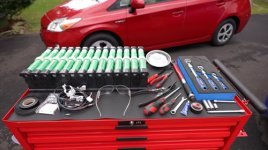evlover
Member
Repairing or replacing the hybrid battery in a 2010-2015 (Gen 3) Toyota Prius can save you thousands compared to dealership prices. Here’s a guide to help you understand the process, potential issues, and costs.
Symptoms of a Failing Prius Hybrid Battery
Dashboard Warning: “Check Hybrid System” light.
Error Codes:
P0A80 – Replace Hybrid Battery Pack
P3011-P3020 – Individual Battery Block Weak
Poor Fuel Efficiency
Reduced Power & Acceleration
Engine Runs More Frequently
Options for Repair/Replacement
Battery Reconditioning (Module Replacement)
Process: Identify weak modules, replace them with healthier ones, balance the pack.
Cost: $500-$1,500 (DIY or hybrid repair shop).
Time: 3-8 hours.
Pros: Cheapest option, extends battery life.
Cons: Temporary fix (1-3 years); other modules may fail.
Refurbished Battery (Rebuilt Pack)
Process: Entire battery pack is rebuilt with used but stronger modules.
Cost: $1,000-$2,500.
Time: 3-5 hours.
Pros: Middle-ground price, decent reliability.
Cons: Less lifespan than new.

New Battery Replacement (OEM or Aftermarket)
Process: Full replacement with a brand-new battery.
Cost:
OEM (Toyota): $2,000-$4,000 (parts only).
Aftermarket: $1,600-$3,000.
Time: 4-6 hours (Toyota-certified tech).
Pros: Longest lifespan (8-10 years).
Cons: Higher initial cost.
DIY Battery Repair
Tools Needed: Torque wrench, battery balancer, voltage meter, socket set.
Process:
Safety First: Disconnect 12V battery and remove the orange service plug.
Disassemble Battery: Remove rear seats and panels to access the battery.
Identify Weak Modules: Use a voltage meter to test each module (normal range: 7.5V - 8.1V).
Replace Modules: Buy compatible modules (often $30-$70 each).
Balance: Use a hybrid battery charger/discharger to balance the pack.
Common Problems
Heat Damage: Gen 3 Prius batteries tend to overheat, degrading faster.
Corrosion: Internal corrosion on bus bars and connections can create resistance.
Fan Clogging: The hybrid battery fan can clog with debris, leading to overheating.
Preventative Maintenance
Clean Hybrid Battery Fan: Every 30,000 miles.
Drive Regularly: Sitting idle accelerates battery degradation.
Monitor with OBD2 Scanner: Use apps like Dr. Prius to check battery health.
Key Tips
DIY Difficulty: Moderate – if you’re comfortable with basic electrical work and safety procedures.
Battery Sources: eBay, hybrid repair shops, and auto recyclers often sell refurbished modules.
Rebuild Kits: Some companies sell entire rebuild kits for DIY repairs.
Youtube
Symptoms of a Failing Prius Hybrid Battery
Dashboard Warning: “Check Hybrid System” light.
Error Codes:
P0A80 – Replace Hybrid Battery Pack
P3011-P3020 – Individual Battery Block Weak
Poor Fuel Efficiency
Reduced Power & Acceleration
Engine Runs More Frequently
Options for Repair/Replacement
Battery Reconditioning (Module Replacement)
Process: Identify weak modules, replace them with healthier ones, balance the pack.
Cost: $500-$1,500 (DIY or hybrid repair shop).
Time: 3-8 hours.
Pros: Cheapest option, extends battery life.
Cons: Temporary fix (1-3 years); other modules may fail.
Refurbished Battery (Rebuilt Pack)
Process: Entire battery pack is rebuilt with used but stronger modules.
Cost: $1,000-$2,500.
Time: 3-5 hours.
Pros: Middle-ground price, decent reliability.
Cons: Less lifespan than new.

New Battery Replacement (OEM or Aftermarket)
Process: Full replacement with a brand-new battery.
Cost:
OEM (Toyota): $2,000-$4,000 (parts only).
Aftermarket: $1,600-$3,000.
Time: 4-6 hours (Toyota-certified tech).
Pros: Longest lifespan (8-10 years).
Cons: Higher initial cost.
DIY Battery Repair
Tools Needed: Torque wrench, battery balancer, voltage meter, socket set.
Process:
Safety First: Disconnect 12V battery and remove the orange service plug.
Disassemble Battery: Remove rear seats and panels to access the battery.
Identify Weak Modules: Use a voltage meter to test each module (normal range: 7.5V - 8.1V).
Replace Modules: Buy compatible modules (often $30-$70 each).
Balance: Use a hybrid battery charger/discharger to balance the pack.
Common Problems
Heat Damage: Gen 3 Prius batteries tend to overheat, degrading faster.
Corrosion: Internal corrosion on bus bars and connections can create resistance.
Fan Clogging: The hybrid battery fan can clog with debris, leading to overheating.
Preventative Maintenance
Clean Hybrid Battery Fan: Every 30,000 miles.
Drive Regularly: Sitting idle accelerates battery degradation.
Monitor with OBD2 Scanner: Use apps like Dr. Prius to check battery health.
Key Tips
DIY Difficulty: Moderate – if you’re comfortable with basic electrical work and safety procedures.
Battery Sources: eBay, hybrid repair shops, and auto recyclers often sell refurbished modules.
Rebuild Kits: Some companies sell entire rebuild kits for DIY repairs.
Youtube
